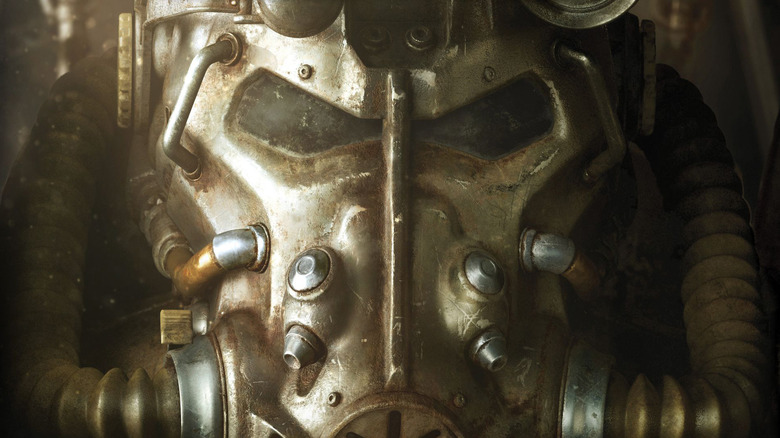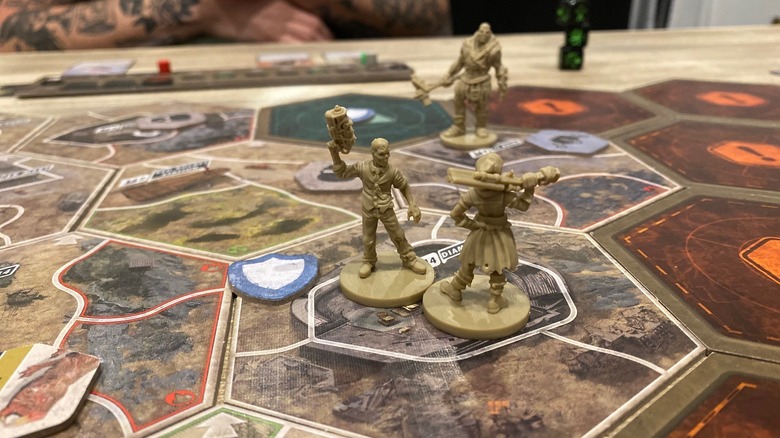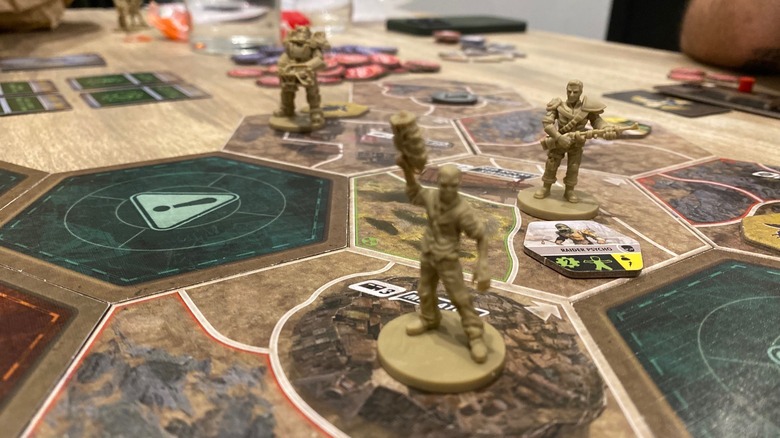Fallout: Atomic Bonds Turns Post-Apocalyptic Game Into A Wasteland Wonder
(Welcome to Cardboard Cinema, an ongoing series where we look at board games inspired by or connected to our favorite media. In this edition, we look at the tabletop board game set in post-apocalyptic future-world of the "Fallout" franchise.)
In 2017, I preordered a copy of "Fallout" by Fantasy Flight Games. Bethesda's video game series is one of my favorite franchises; I own a copy of the "Fallout" RPG system and the kinder, gentler "Fallout Shelter" board game, and I was looking forward to adding the board game to my collection. Little did I know that it would take almost five years for the "Fallout" board game to live up to my expectations. Today, fans willing to expand their investment — "Fallout" and its 2021 expansion "Fallout: Atomic Bonds" — would turn a promising-but-broken game into one of my favorite tabletop experiences.
First introduced in 1997, the "Fallout" video game series invited players to a post-apocalyptic future where humanity has retreated underground in the wake of a nuclear apocalypse. Thanks to the efforts of Vault-Tec — a retro-futuristic corporation that made a fortune selling fallout bunkers as planned communities — the game positions you as a Vault Dweller, taking your first steps into the outside world (this premise is also used for "Fallout 3" and "Fallout 4"). Much to your surprise, life on the surface has continued, undeterred by radiation and economic collapse. The farther you venture from your Vault, the more wondrous the creatures and communities you encounter. Oh, and the "Fallout" series has some of the best playlists of 1950s music.
From screen to table
Let's start here: much of the franchise has been successfully ported into the core board game. At the beginning of each session, players will choose a starting scenario — and its corresponding update in the "Fallout: Atomic Bonds" box, but more on that in a minute — and build the hexagonal board to its specifications. The result will be a modular representation of the Commonwealth, the post-apocalyptic New England setting for "Fallout 4." Once the starting quests have been revealed, players will take turns traveling around the map, exploring locations, and revealing townships and enemy spawn points. Advancing the main storyline will add cards to your encounter decks, and players spend much of the game visiting and revealing Wasteland and Settlement cards for important story events.
"Fallout" is, in essence, a storybook game. Each quest or encounter you undertake provides multiple paths to success, and players can choose how best to proceed. For example, say you come across a group of survivors holding a foot race; you might join the competition, practice your skills on the track after they're done, or even loot their belongings after the race has started. Successful encounters will often add new cards to the Wasteland and Settlement decks, creating an ever-evolving narrative that will lead you to the weirdest corners of the "Fallout" universe. Like the games, there are main and side quests and, if you're meticulous, opportunities to uncover new vaults out in the wilderness.
The mechanics of the "Fallout" board game also revolve around the franchise's unique S.P.E.C.I.A.L. system. This skill tree, which stands for Strength, Perception, Endurance, Charisma, Intelligence, Agility, and Luck, defines the attributes of a player in the video game, but their uses have been modified slightly for the board game. While "Fallout" does include a leveling system, players can only have one point in each skill, which they will use to reroll dice during skill checks or activate companions and items in their inventory. Nothing comes easy in "Fallout," and having a well-rounded set of skills and tools that play into those abilities dramatically increases your odds of success.
"Fallout" also does an impressive job of translating the V.A.T.S. (Vault-Tec Assisted Targeting System) mechanic to the tabletop game. Each creature you face will be susceptible to certain types of damage — head, arms, legs, or body — and players roll V.A.T.S. dice to determine which body parts are damaged during the fight. But the V.A.T.S. dice also include player hits, and managing incoming and outgoing damage is crucial. Like skill checks, weapons will also allow you to reroll dice depending on your S.P.E.C.I.A.L. skills, but your arsenal is capped at three dice. Rerolls and automatic hits are wildly important when venturing into the more difficult sections of the board.
Creating the perfect expansion
Much care has gone into providing an authentic "Fallout" experience for the Fantasy Flight board game. But these immersive experiences came at a cost: in the months following the release of "Fallout," fans quickly realized that the endgame mechanics were fatally broken. For one, "Fallout" was released as a quasi-competitive game; you might not be able to attack your opponents outright, but nothing allowed you to pool resources, either. Even worse, the cards that triggered influence changes would appear randomly. All good games have an inherent sense of momentum, but the base game of "Fallout" would often end arbitrarily, with a winner often decided by the flip of a card rather than the progression of a narrative.
Fantasy Flight changed all that with "Fallout: Atomic Bonds." Thanks to a handful of new cards — and one or two key rule revisions — the designers could restore the game's cooperative promise while building each session around clear, escalating stakes. Instead of jockeying for power between two sides, "Atomic Bonds" asks you to choose your allies at the outset. Then, the campaign becomes a race against the clock: the reworked agenda deck will slowly increase the opposing faction's influence, motivating you to make expedient choices about how to spend your action points (another mechanic lifted from the video game series). If you can meet the victory conditions in time, you and your party will become the Last, Best Hope of Humanity. A few minor tweaks to these scenarios turned a broken PvP experience into a glorious PvE adventure.
So yes, "Fallout" is a great game — provided you have the add-on. For many people, purchasing a game while knowing it needs an expansion to work is a hard pill to swallow. No objections here; video gamers know better than most how frustrating it can be to wait for a broken game to get a proper patch. But if you're a fan of the "Fallout" series, or you just like a post-apocalyptic game with clever writing and a bunch of fun mechanics, then "Fallout" is worth the extra effort.
Now, if you'll excuse me, I've got to figure out if the "New California" expansion is also worth a purchase.


